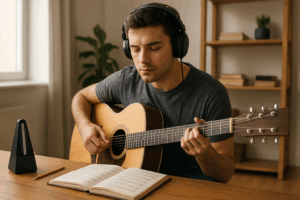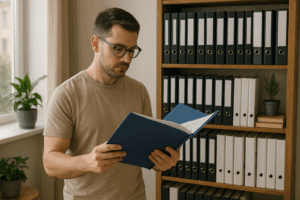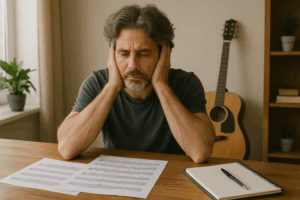very musician and composer experiences creative blocks at some point in their journey. Whether you’re working on a song, an instrumental piece, or any form of music, feeling stuck can be frustrating. The good news is that creative blocks are normal, and there are plenty of strategies you can use to overcome them. In this article, we’ll explore practical tips for breaking through creative blocks and reigniting your musical inspiration.
1. Change Your Environment
Sometimes, a change of scenery can help spark new ideas. If you’re feeling stuck, try moving your practice or composition space to a different location. A fresh perspective on your environment can help your mind break free from the mental rut.
How to Change Your Environment:
- Try a Different Room: If you usually compose in one room, move to another part of your home or studio. A change in surroundings can help you see things in a new light.
- Go Outdoors: If possible, take your instrument outside. Nature has a way of inspiring creativity, and the change in atmosphere might give you the spark you need.
- Organize Your Workspace: A cluttered workspace can contribute to feeling overwhelmed. Take a moment to tidy up your area, organize your sheet music, or clear any distractions. A neat environment can help clear your mind as well.
A new environment can help refresh your creativity and push past the block that’s holding you back.
2. Experiment with Different Instruments or Sounds
One way to overcome a creative block is to step away from your usual approach. Experimenting with different instruments, sounds, or even digital software can open new creative doors and help you think outside the box.
How to Experiment:
- Try a Different Instrument: If you’re a pianist, try writing music on the guitar or use a synthesizer. If you typically use acoustic instruments, experiment with digital sounds and loops.
- Use Music Production Software: If you’re primarily a performer, try composing in music production software like Ableton, Logic, or FL Studio. These platforms offer endless possibilities for sound manipulation and composition.
- Change the Sound Palette: Even if you stick with the same instrument, change the sounds you’re using. For example, use a different setting on your piano or guitar pedals, or experiment with new recording techniques.
Exploring new instruments or soundscapes can bring new life to your compositions and open up creative pathways.
3. Set Constraints for Yourself
Sometimes, having too many options can make it harder to get started. To break through a creative block, try setting limitations. By limiting your choices, you’ll force yourself to focus on specific elements and find creative solutions within those boundaries.
How to Set Constraints:
- Use a Limited Number of Notes: Write a piece using only a small set of notes, like a specific scale or even just a few chords. These restrictions can push you to get creative with your melody and rhythm.
- Pick a Specific Genre or Style: Limit yourself to a particular genre (like jazz, classical, or rock) and try composing within that style. This focus can help narrow down your options and spark new ideas.
- Time Limits: Set a timer for a short session, such as 30 minutes, and challenge yourself to create as much as you can within that time frame. The pressure to complete something in a limited amount of time can encourage creativity.
By imposing constraints, you can move past the block and start generating ideas you might not have thought of otherwise.
4. Collaborate with Other Musicians
Collaboration can be an excellent way to overcome creative blocks. Working with other musicians brings fresh ideas and perspectives to the table, which can inspire new directions for your compositions.
How to Collaborate Effectively:
- Jam with Other Musicians: If you’re stuck, try jamming with friends or fellow musicians. Even if you’re not actively composing, playing with others can inspire new musical ideas that you can develop further.
- Seek Feedback: Share your ideas with a collaborator or mentor. Sometimes, just talking through your music or getting feedback from someone else can help you see it in a new light and provide the inspiration you need.
- Write Together: Collaborate on the writing process itself. Let your collaborator bring their own creative energy and ideas to the project, which can help push you past your mental block.
Collaboration helps you move beyond your creative limits and brings new energy to your music-making process.
5. Take a Break and Come Back with Fresh Ears
If you’ve been working on a piece for a long time and feel like you’re not getting anywhere, sometimes the best solution is to take a break. Giving yourself time away from your music allows you to return with a clearer mind and a fresh perspective.
How to Take an Effective Break:
- Step Away for a Day or Two: Put your music aside for a while and do something completely different. Engage in an activity that clears your mind, like going for a walk, reading, or listening to a different style of music.
- Engage with Different Art Forms: Try exploring other creative outlets, such as painting, writing, or dancing. These activities can inspire new ideas and help refresh your musical thinking.
- Return with a Fresh Perspective: When you come back to your music after a break, listen with fresh ears. You might discover new possibilities or solutions you missed earlier.
Taking a break can help you return to your music with renewed energy and fresh ideas, allowing you to tackle creative blocks more effectively.
6. Listen to Music from Different Genres
Listening to music outside of your usual genre can inspire new approaches to your composition. Exposing yourself to different musical ideas can help you think outside the box and influence your creative process in unexpected ways.
How to Use Music for Inspiration:
- Explore Different Genres: Listen to music from genres you don’t typically explore. For example, if you usually compose classical music, try listening to electronic, jazz, or folk music. You’ll likely hear new rhythmic patterns, harmonies, or instrumentation that can spark inspiration.
- Focus on Arrangement and Structure: Pay attention not just to the melodies but also to how songs are structured and arranged. Observe how the music flows, how tension is created, and how melodies are developed throughout the piece.
- Analyze Unfamiliar Music: Take a deep dive into unfamiliar music and analyze how it’s put together. Understanding how other musicians approach composition can help you gain new insights into your own process.
Exposure to diverse music can enrich your creativity and provide you with the tools to break through a block.
7. Write Without Judgment
Sometimes, creative blocks happen when we overthink and judge our own ideas before they even have a chance to form. A great way to overcome this is by writing freely and without judgment. The goal is to generate as many ideas as possible without worrying about how perfect they are.
How to Write Without Judgment:
- Freewriting: Set a timer for 10–15 minutes and write music continuously without worrying about mistakes. Don’t pause to evaluate or critique—just let the ideas flow.
- Record Everything: Don’t delete or discard anything you create, even if you think it’s not good enough. Record your ideas and come back to them later. Sometimes, even unfinished ideas can lead to something great down the road.
- Focus on Expression, Not Perfection: Let go of the need for everything to be perfect right away. Allow your music to evolve naturally, and remember that the creative process is about exploration.
By letting go of judgment, you free yourself to create without fear, which can help push past the block.



